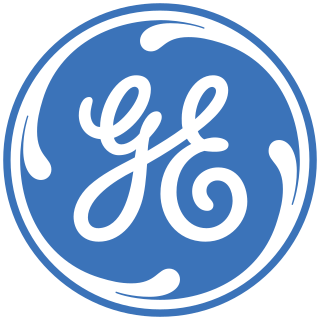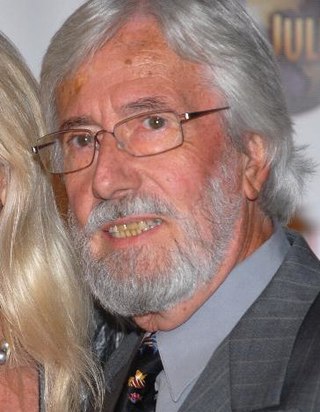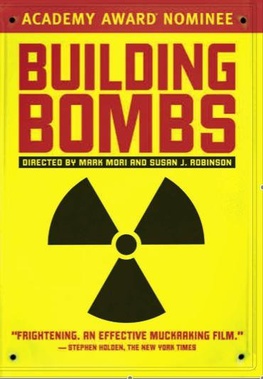
General Electric Company (GE) was an American multinational conglomerate founded in 1892, incorporated in the state of New York and headquartered in Boston. The company had several divisions, including aerospace, energy, healthcare, and finance.

The Atomic Cafe is a 1982 American documentary film directed by Kevin Rafferty, Jayne Loader and Pierce Rafferty. It is a compilation of clips from newsreels, military training films, and other footage produced in the United States early in the Cold War on the subject of nuclear warfare. Without any narration, the footage is edited and presented in a manner to demonstrate how misinformation and propaganda was used by the U.S. government and popular culture to ease fears about nuclear weapons among the American public.

The Atomic Age, also known as the Atomic Era, is the period of history following the detonation of the first nuclear weapon, The Gadget at the Trinity test in New Mexico on 16 July 1945 during World War II. Although nuclear chain reactions had been hypothesized in 1933 and the first artificial self-sustaining nuclear chain reaction had taken place in December 1942, the Trinity test and the ensuing bombings of Hiroshima and Nagasaki that ended World War II represented the first large-scale use of nuclear technology and ushered in profound changes in sociopolitical thinking and the course of technological development.

Trinity and Beyond: The Atomic Bomb Movie is a 1995 American documentary film directed by Peter Kuran and narrated by William Shatner.

Jean-Michel Cousteau is a French oceanographic explorer, environmentalist, educator and film producer. The first son of ocean explorer Jacques Cousteau, he is the father of Fabien Cousteau and Céline Cousteau.

The Panama Deception is a 1992 American documentary film, critical of the 1989 United States invasion of Panama.

A Is for Atom (1953) is a 14-minute promotional animated short documentary film created by John Sutherland and sponsored by General Electric (GE). The short documentary, which is now in the public domain, explains what an atom is, how nuclear energy is released from certain kinds of atoms, the peacetime uses of nuclear power, and the by-products of nuclear fission. The film is Sutherland's most-decorated film, having won numerous honors at film festivals.

William J. Broad is an American science journalist, author and a Senior Writer at The New York Times.
Corporate Accountability is a non-profit organization, founded in 1977. Their campaign headquarters are in Boston, Massachusetts, and they have offices in Oakland, California; Seattle, Washington; and Bogotá, Colombia.
The 1970s proved to be a pivotal period for the anti-nuclear movement in California. Opposition to nuclear power in California coincided with the growth of the country's environmental movement. Opposition to nuclear power increased when President Richard Nixon called for the construction of 1000 nuclear plants by the year 2000.
Leslie Cockburn is an American investigative journalist, and filmmaker. Her investigative television segments have aired on CBS, NBC, PBS Frontline, and 60 Minutes. She has won an Emmy Award, The Hillman Prize, Alfred I. duPont–Columbia University Award, Robert F. Kennedy Journalism Award, and the George Polk Award.

Debra Chasnoff was an American documentary filmmaker and activist whose films address progressive social justice issues. Her production company GroundSpark produces and distributes films, educational resources and campaigns on issues ranging from environmental concerns to affordable housing to preventing prejudice.

Building Bombs is a 1990 American documentary film produced and directed by Mark Mori and Susan J. Robinson.
Fawn Yacker is an American filmmaker, producer, and cinematographer. She also co-found the LGBT organization "The Last Closet".

Countdown to Zero is a 2010 documentary film by British filmmaker Lucy Walker. The film argues that the likelihood of the use of nuclear weapons has increased since the end of the Cold War due to terrorism, nuclear proliferation, theft of nuclear materials and weapons, and other factors.
Adrian Levy is a journalist and film maker who writes for The Guardian.
An electromagnetic pulse (EMP), also referred to as a transient electromagnetic disturbance (TED), is a brief burst of electromagnetic energy. The origin of an EMP can be natural or artificial, and can occur as an electromagnetic field, as an electric field, as a magnetic field, or as a conducted electric current. The electromagnetic interference caused by an EMP can disrupt communications and damage electronic equipment. An EMP such as a lightning strike can physically damage objects such as buildings and aircraft. The management of EMP effects is a branch of electromagnetic compatibility (EMC) engineering.

The Bomb is a 2015 American documentary film about the history of nuclear weapons, from theoretical scientific considerations at the very beginning, to their first use on August 6, 1945, to their global political implications in the present day. The film was written and directed by Rushmore DeNooyer for PBS. The project took a year and a half to complete, since much of the film footage and images were only recently declassified by the United States Department of Defense.












